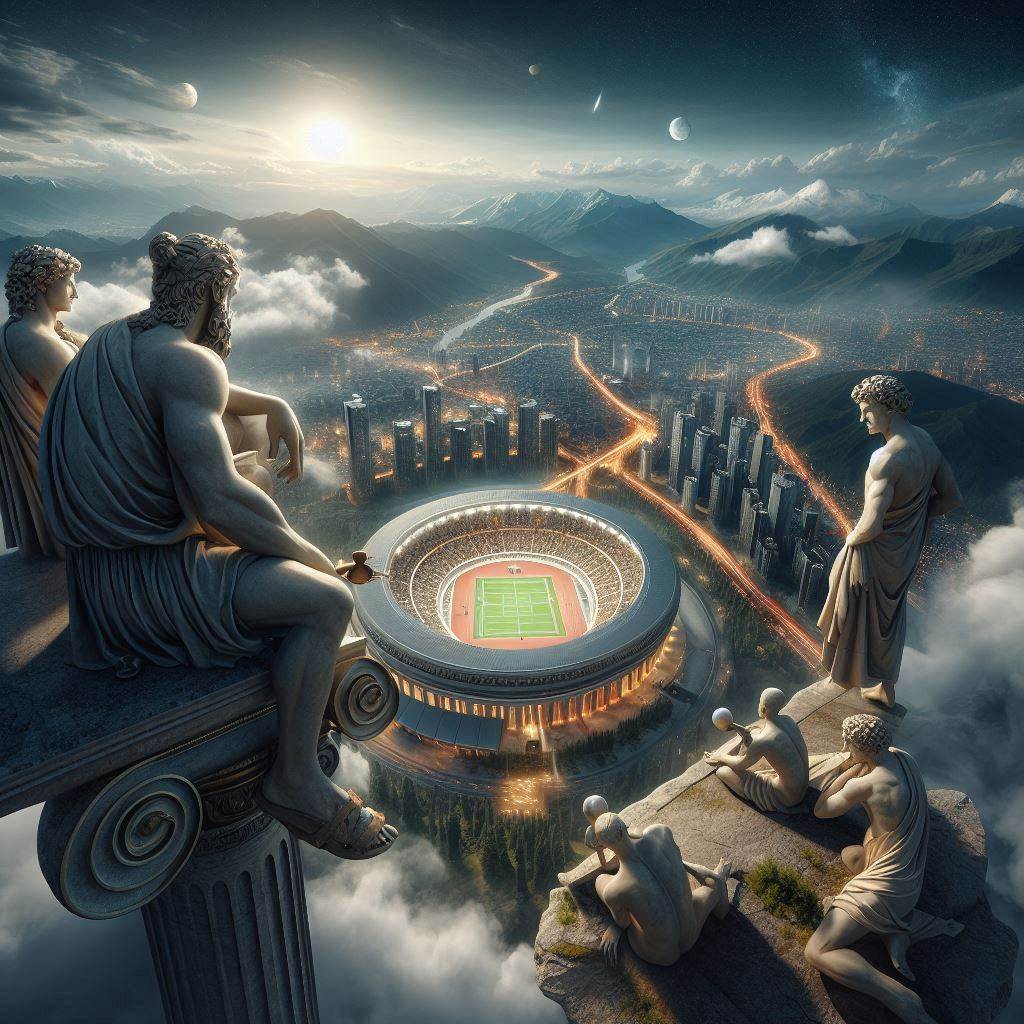The Myth of Olympia
Three Ideas to Rediscover Its Spirit

Vision paper on the geopolitics of the Olympic Games.
In the classical Greece that gave birth to the myths of Western culture, the Olympic Games were held every four years in the same location. Around a colossal statue of Zeus, there was an Olympic village complete with stadiums and pools. The city-states would agree to a truce, pausing their endless rivalries to allow athletes to travel safely to Olympia. In the modern era, it was at the Barcelona Games in 1992 that the United Nations began calling for a similar truce, asking nations to cease hostilities for the duration of the Games - from the week before the Olympics until the closing ceremony of the Paralympics. Yet, from the start, this truce has been repeatedly violated, with the International Olympic Committee’s (IOC) sanctions failing to make a significant impact. The contradictions between the ideals revived by a Frenchman and the pursuit of peace seem particularly poignant in Paris.
It was in Athens in 2004 that, for the first time, the Olympic flame was carried from Olympia after traveling the world, reminding everyone that peace is a moral imperative. However, almost without fail, the Games have found themselves overshadowed by wars that continue unabated. In 2022, the paradoxical task fell to the Chinese to inform the Russian Olympic Committee that their invasion of Ukraine made it impossible for them to participate in the Winter Paralympics. Russians and Belarusians are largely excluded from the Paris Games as well (with the exception of eleven athletes competing individually), but there have been calls to apply the same standard to Israeli athletes. As the Paris Olympics dream of a world without borders along the Seine, the real world is plunging into new depths, with the tragedy in Gaza spiraling into an uncontrollable conflagration.
There are, in fact, at least three major issues that a realistic interpretation of the Olympic values must eventually address.
First, the double-edged sword of exclusions. These exclusions often have the counterproductive effect of extending the rightful condemnation of a government to an entire people—many of whom see their sports heroes as national symbols. In Russia, this can bolster support for those waging war. Moreover, it becomes difficult to apply such measures fairly in a world with more armed conflicts between sovereign states today (52) than at any time since World War II. A more logical and just approach would be to adopt a permanent resolution allowing all athletes who commit to upholding the United Nations Charter—despite their governments’ rejections of it—to compete under a neutral flag. These athletes, protected and funded by the IOC, could become powerful ambassadors for peace.
Second, the issue of secularism turning into a form of religion that contradicts its own principles. Amnesty International has condemned the French ban on athletes wearing the hijab, a garment associated with Islamic faith. While it is essential to link sports with universal rights, it is equally important not to prohibit expressions of faith for those who choose them (just as no one suggests limiting tattoos, which often symbolize personal beliefs).
Lastly, the universality of certain values is called into question.
At the opening ceremony of the Olympics, athletes were sidelined, and even more so the delegations from non-Western nations. The American and French teams were the last to parade under a brilliantly lit Eiffel Tower, symbolizing la ville lumière. While this reflects the fact that Paris is hosting the Games for the third time in 2024, with Los Angeles set to do so in 2028 (also for the third time), it also true that the United States and France have hosted almost a third (18) of the 57 summer and winter editions. Meanwhile, South America has hosted the Games only once, and Africa never. This supposedly universal vision remains deeply rooted in the myths nurtured in Olympia and later in Rome and yet it is still far from being fulfilled.
Yet, the times are changing. And the evolution in sports parallels the one in economics. In Paris Medal Table of the Paris Olympic games, three of the first top five nations are from Asia/ Oceania; in the all-time ranking before Paris, we only had European countries (including the defunct Soviet Union) plus the United States. Germany which is second (if we include in the notion also East Germany) in the all-time classification, was number 10 in Paris. Three countries won their first ever medal and for two of them – Saint Lucia and Cape Vere – was gold. China which won the same number of gold medals of the USA (40), won its first gold medal in 1984. India won its first Olympic event in 2008, and it is in everyone’s (even commercial) interest that it should be more than just a participant. The mission of the IOC should be to use the platform of global spectacle to promote new developments. It happened in Rio; it should soon happen in Bangalore or Nairobi.
In 1898, a Frenchman recognized that sports could promote a core set of values that belong to all of humanity—values that France was the first to codify. But Pierre de Coubertin’s vision has been worn thin by excessive rhetoric and the interpretations of the bureaucrats who manage a project in Lausanne worth four billion euros annually. To restore the true spirit of the Olympics, inspired by genuine sportsmanship, we need new ideas—visionary and pragmatic, like those once cherished in Olympia.
References:
Euronews. (2024). Does hosting the Olympics boost the economy? Link
Le Monde. (2023). Why Paris 2024 organizers are worried about geopolitics creeping into the Olympics. Link
The Economist. (2021). Olympic glory tends to go hand-in-hand with economic clout. Link

